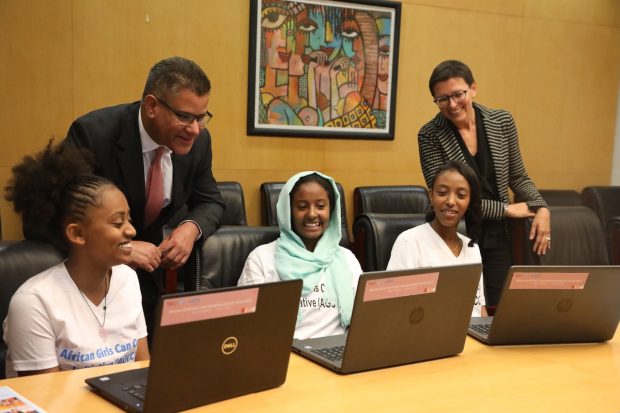
International Development Secretary Alok Sharma wrote this piece about the upcoming UK-Africa Investment Summit in today's Daily Telegraph (January 1, 2020).
Knocking on doors in my Reading West constituency during the general election, I heard very clearly that people were ready to get Brexit done. And they want a positive start to the new decade, a view echoed across our nation.
On January 31, the UK will finally leave the EU. And before that, on January 20, the Prime Minister will host the UK-Africa Investment Summit – a major milestone in international relations.
The Summit will bring together UK and African business representatives, African leaders, international institutions and young entrepreneurs to create new partnerships that will deliver more investment and jobs.
The International Monetary Fund estimates that Africa is home to eight of the world’s 15 fastest growing economies. By 2050, one in four global consumers will be African. The UK wants and needs closer trading partnerships with African nations – and Africa needs much more capital. Currently, African countries receive less than 4pc of foreign direct investment.
This is a wasted opportunity. Moreover, an extra $2.5 trillion (£1.9 trillion) is needed every year to end poverty in developing countries and meet the 17 Global Goals, which aim to make the world a fairer, healthier, safer and more prosperous place for everyone, everywhere by 2030. So there is an urgent need to mobilise far more private sector investment.
Before I entered politics, I worked for more than 15 years in corporate finance in the City, where I saw for myself the value of foreign investment. Simply put, it is a catalyst for prosperity.
Investment in businesses creates sustainable jobs. Investment in infrastructure enables children to go to school. Investment in vital public services like health and education gives young people the opportunity to shape their own futures and reach their potential. It is the difference between surviving and thriving.
I want the UK to be the investment partner of choice for African nations, by creating new and lasting partnerships that benefit businesses and people in Africa and the UK alike.
UK businesses are already leading the way in investing in Africa. Diageo has a state-of-the-art, environmentally friendly brewery in Kenya, which supports tens of thousands of jobs. The Cambridge solar power company Azuri Technologies is a commercial provider of pay-as-you go solar energy systems to off-grid homes across Africa. Northamptonshire-based Blue Skies Fruit works with small agricultural producers to export fruit to the UK and elsewhere.
Business and finance go hand in hand. The City of London, home to the world’s major investors and multinational businesses, and to forward-looking regulators and innovators, is already the financial centre of choice for African institutions. The London Stock Exchange has more bonds from African countries listed or trading than any other international stock exchange. But we want to do more.
In September I announced £90m of UK aid that will help generate more than £500m of private sector investment in financial markets. This will help small African financial services businesses and start-ups to grow and create 50,000 jobs. All of which will drive economic development.
As a result, 12.5m people – half of them women and girls – will have better access to financial services, including loans and bank accounts. This will help female entrepreneurs overcome the $42bn financing gap faced by small and medium sized African businesses owned by women.
Local currency financing – in which the UK excels – is critical, because businesses and jobs in African countries need longer term investment protected from exchange rate fluctuations. Developing markets for local currency bonds helps to insulate borrowers from these risks and to mobilise international investment. The UK is already home to many offshore local currency bonds from developing countries including Indonesia’s Komodo bond and India’s Masala bond.
When I was the Prime Minister’s infrastructure envoy to India, I was part of the team that helped develop the Masala bond market in London. These have been a real success, mobilising long-term funding for infrastructure in India, as well as sending a clear signal of the demand for high-quality investment in the country. Several private sector development projects in India have been financed through the bonds, including the first green Masala bond, which is now supporting the use of solar energy across India.
As International Development Secretary, my team and I have been actively discussing local currency products with governments in Africa. This follows the success of UK aid-backed GuarantCo’s action to help bring the first Ghanaian Cedi corporate bond to be listed on the London market.
The UK-Africa Investment Summit will mark a step-up in our efforts to promote access to local currency finance, particularly for African economies, which will give UK-based investors more options to invest in support of Africa’s growth.
We want to encourage multilateral development banks to lend more in the local currency of the borrower. We will provide support to African countries and businesses to increase the number of first-time issues of local currency bonds, to help them build a track record and show they are financially viable.
This is part of our continuing efforts to increase the number of investors with an appetite for such local currency assets in developing countries – and the financial opportunities they can bring.
The UK will do all it can to help Africa attract sustainable investment and expand opportunities for British businesses.
Together we can make 2020 a transformative year